beglaubigt.de
Create a Legally Secure Living Will
Generate a legally reviewed living will as a .PDF in no time, following the latest standards. The template is free and fully customizable.
CREATE PDF NOW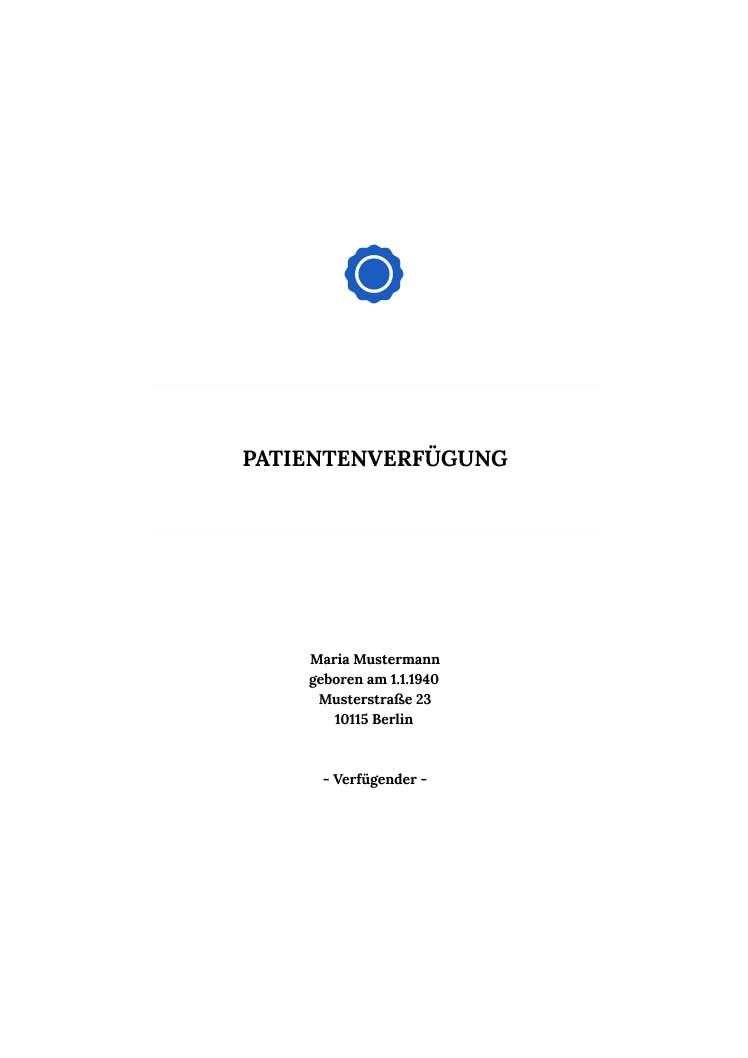
+10 Tausend
Verträge erstellt
100%
Anpassbare Vorlagen
2 Minuten
Bis zur Fertigstellung
4 Stunden
Zeiteinsparung
In Collaboration with Top Lawyers for Legal Security
All contract templates have been created by a team of legal experts and are regularly reviewed for updates. We continuously work to provide legally compliant and up-to-date contract drafts.
And it's simple and digital. Do you have a special case? We’ll handle it.
 Peter MendelRechtsanwalt und Fachanwalt
Peter MendelRechtsanwalt und Fachanwalt für Arbeitsrecht

Customizable living will for download as PDF or Word document.
Once completed, your living will is available for download in the desired file format for further editing or future use.
A secure link ensures that the document remains accessible, allowing you flexibility for future changes or updates.
Living wills are essential to ensure that your personal wishes and preferences regarding medical care are followed in the event of incapacitation.
In this comprehensive overview, we will explore various aspects of living wills, examine current laws and legal rulings, and draw on the expertise of Beglaubigt.de to provide you with an understandable and well-founded guide.
We will also introduce Beglaubigt.de’s document creator, which allows you to quickly and easily create legally secure living wills as PDF or Word documents.
What is a Living Will?
A living will is a written document in which a person specifies in advance which medical treatments they wish to receive or refuse in the event that they are unable to make decisions in the future.
This mainly concerns situations where the person is no longer able to express their will regarding medical treatment due to unconsciousness, severe illness, or accidents.
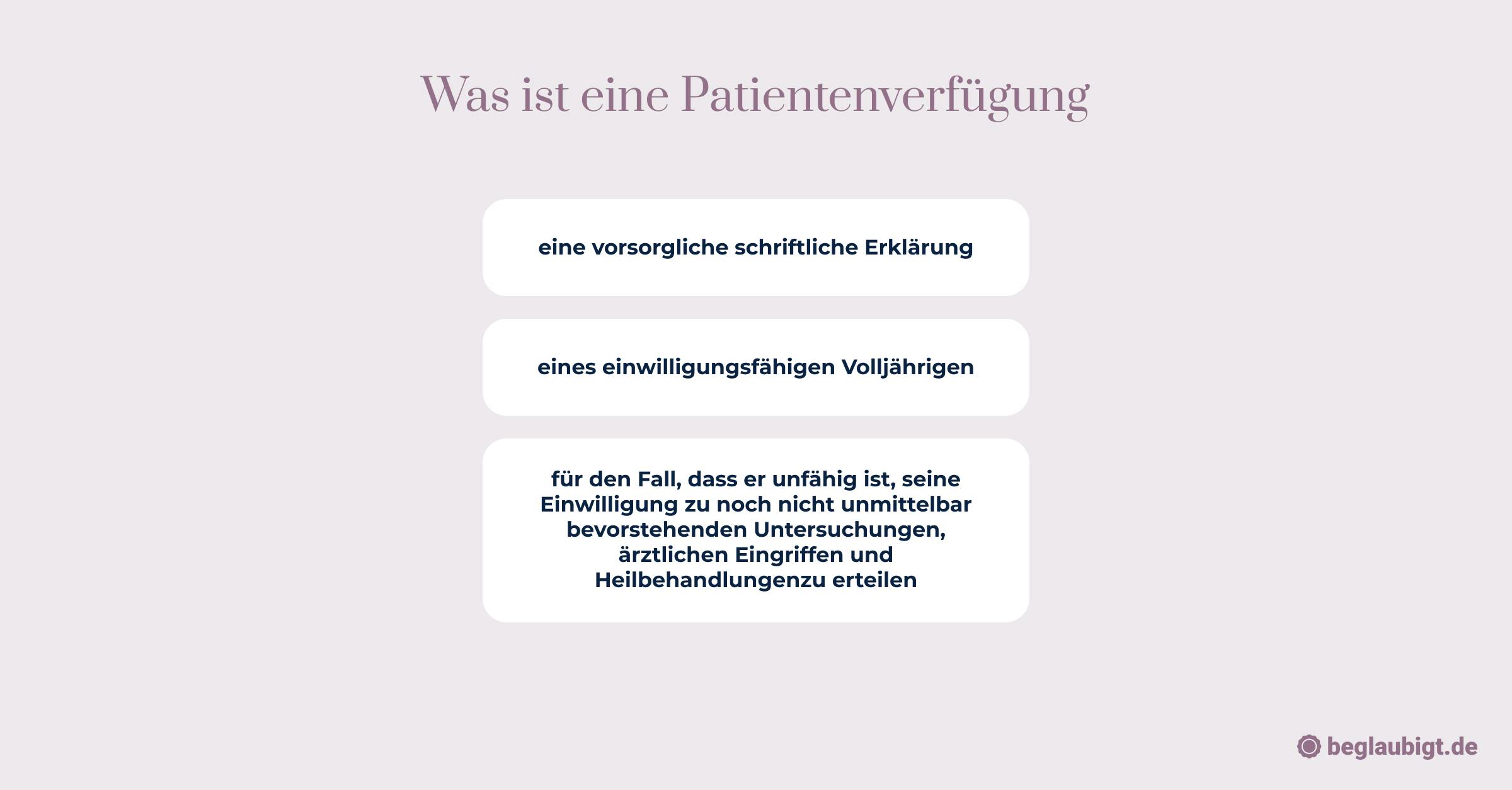
The living will serves as a guideline for doctors and medical staff, ensuring that the patient’s treatment wishes are respected. It can address issues such as life-sustaining measures, pain management, or palliative care.
The legal basis for living wills in Germany is found in the Civil Code (BGB). According to § 1901a BGB, patients have the right to document their will regarding specific medical measures in writing, ensuring their self-determination in situations where they can no longer express their wishes.
The living will must be concrete, precise, and comprehensible for doctors to use it as a binding decision-making guide.
Some examples of medical measures that can be addressed in a living will include:
- Resuscitation: Consent or refusal of CPR in case of cardiac arrest
- Artificial Nutrition: Consent or refusal of artificial feeding via feeding tube or intravenously
- Ventilation: Consent or refusal of artificial ventilation, e.g., through intubation or a ventilator
- Dialysis: Consent or refusal of dialysis in case of kidney failure
- Organ Transplantation: Consent or refusal of organ transplants or specific organs
A living will, especially with the template from Beglaubigt.de, can be customized to reflect the patient’s personal wishes and preferences, and then signed and notarized. (See: Signature Certification)
1.2. What Are the Benefits of a Living Will for Patients and Their Families?
A living will offers several benefits for both the patient and their family members, as outlined below:
- Self-determination: A living will allows patients to decide on their medical care and treatment preferences in advance. This strengthens their right to self-determination and ensures that their personal values and wishes are respected, even in situations where they can no longer express them.
- Clarity for Medical Staff: A well-formulated living will provides doctors and medical staff with clear, binding instructions. This facilitates decision-making in critical situations and ensures that treatment is in line with the patient’s wishes.
- Relief for Family Members: Creating a living will can relieve family members during difficult times. If the patient’s wishes regarding medical treatment are clearly defined, family members are not forced to make decisions under emotional stress or uncertainty. This can prevent conflicts and allow families to focus on caring for and supporting the patient.
- Legal Security: A living will provides legal certainty by clearly documenting the patient’s medical wishes and ensuring compliance with legal regulations. This ensures that the will is legally binding and respected by the relevant authorities when needed.
- Prevention of Disputes: A living will can prevent disputes or disagreements between family members and medical staff by providing clear instructions regarding the desired treatment. This contributes to family harmony and encourages unified support for the patient during difficult times.
- Time and Cost Savings: A living will can help save time and costs by avoiding unnecessary or unwanted medical treatments. By specifying personal preferences, patients can exclude costly and burdensome life-prolonging measures that they deem unnecessary.
In conclusion, a living will offers numerous benefits for patients and their families. It ensures the right to self-determination, provides clarity and legal certainty, and helps reduce burdens and conflicts in emotionally challenging situations.
What Are the Disadvantages of a Living Will?
Despite the many benefits, there are also some disadvantages to consider:
- Insufficient Formulation: If a living will is not clearly and precisely formulated, it may be difficult for doctors and caregivers to implement. An unclear or vague living will may result in the patient’s true wishes not being respected, as the document may not be specific enough for the current life or medical situation.
- Lack of Flexibility: Once a living will meets the legal requirements, it becomes binding. This means it must be followed in applicable situations, even if the patient’s views may have changed over time. In such cases, the will could limit the patient’s or their family’s decision-making flexibility.
- Unforeseen Medical Developments: Living wills are usually created based on the current state of medical knowledge and the patient’s personal preferences. However, medical practices and knowledge may evolve, potentially making the living will less suitable for the current situation.
- Misconceptions: When creating a living will, the patient may misjudge certain situations or medical procedures. This could lead to decisions that they may not have made under different circumstances.
- Emotional Pressure on Family Members: In some cases, a living will may place emotional pressure on family members, who may be faced with implementing decisions that they personally would not have made.
Legally Secure Living Wills Create Easily Online
Beglaubigt.de helps you create a legally secure living will with immediate validity. The simple and intuitive document creator covers all modalities for a comprehensive yet straightforward living will.
Start exploring our tool without obligation.

Legal Foundations of Living Wills in Germany
2.1. What are the legal regulations for living wills?
The legal regulations for living wills in Germany are anchored in the Civil Code (BGB). The key provisions can be found in §§ 1901a to 1901c BGB. Below are the most important regulations and principles explained:
1. § 1901a BGB – Self-determination and Living Will
This paragraph states that every patient has the right to document their will regarding specific medical measures in writing. A living will allows the patient to maintain self-determination in situations where they can no longer express their will. Doctors and caregivers are obliged to follow the living will if it is formulated concretely and precisely and applies to the current life and treatment situation.
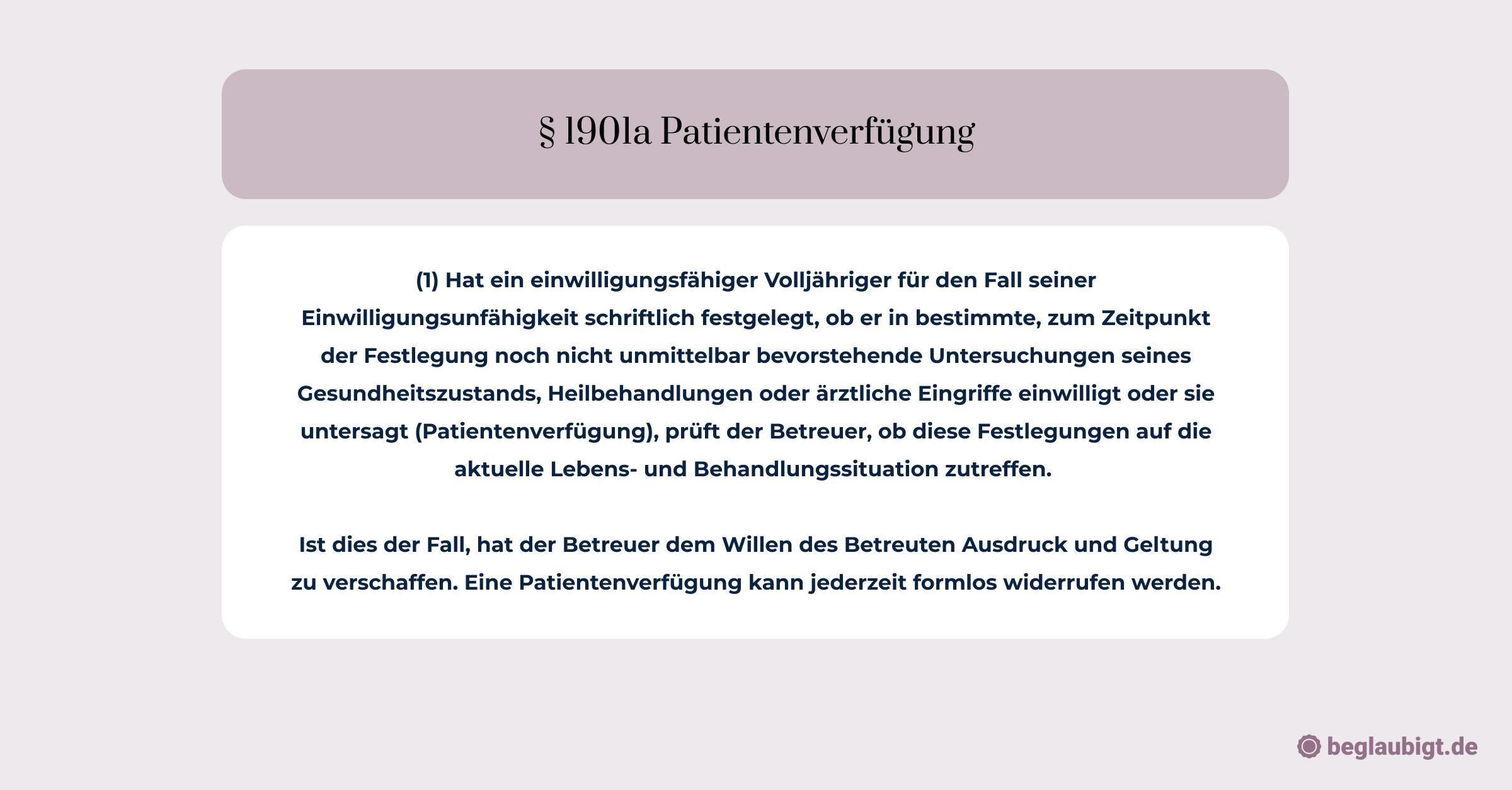
2. § 1901b BGB – Guardianship and Respecting the Patient’s Will
This paragraph outlines the duties of the guardian regarding the implementation of the patient’s will. The guardian is required to determine the patient’s presumed will and act accordingly. The living will is to be considered as an expression of the patient’s actual will.
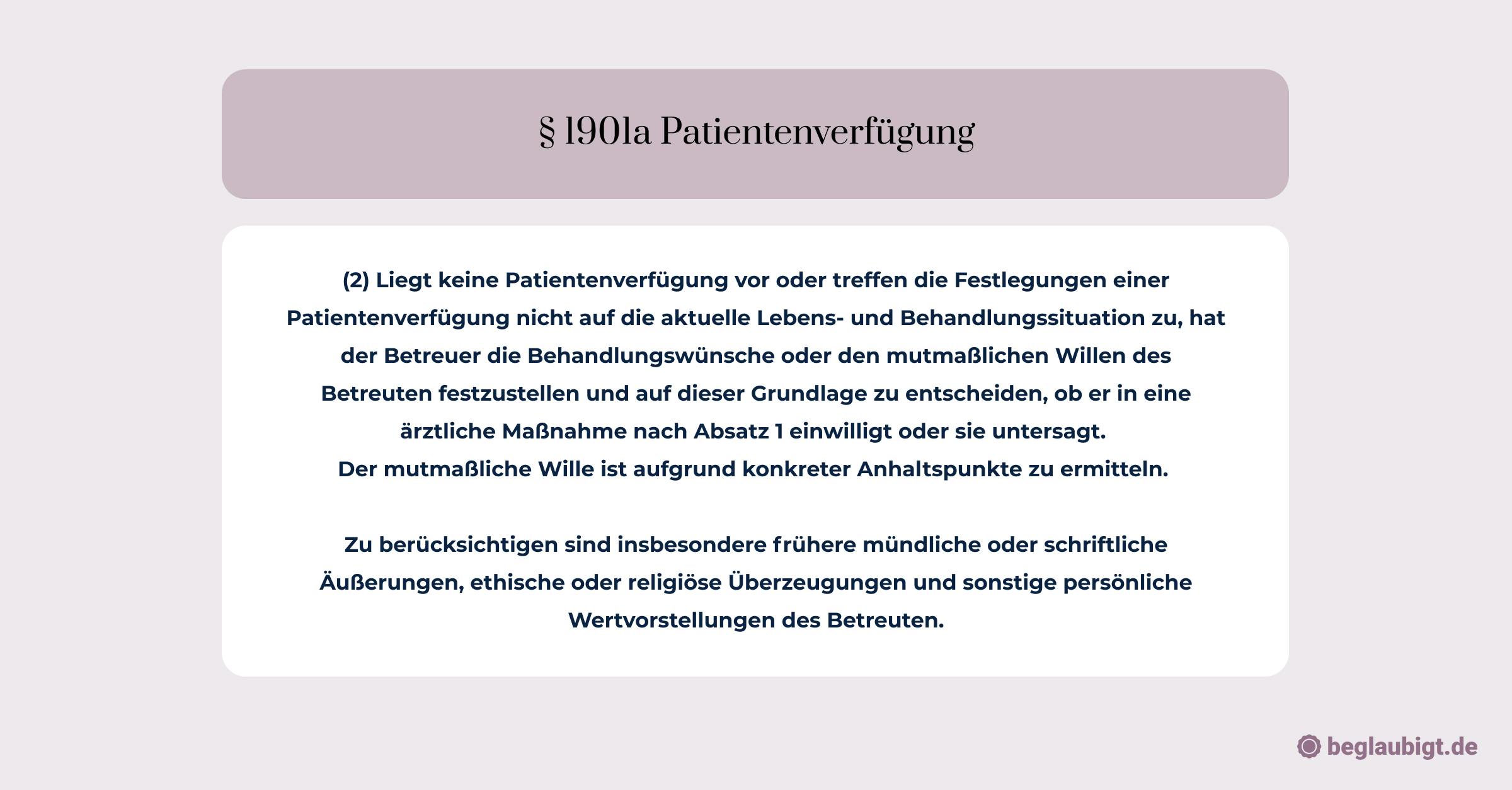
3. § 1901c BGB – Court Approval for Medical Measures
In certain cases, such as the implementation of compulsory measures or the refusal of life-sustaining treatments, court approval is required. The guardian must seek approval from the guardianship court and wait for the court’s decision before implementing the corresponding measures.
In addition to these central regulations in the BGB, there are supplementary legal provisions in other laws, such as guardianship law or the Criminal Code (StGB). These include rules on patient protection, dealing with euthanasia, and medical confidentiality.
Intuitive Questions Without Complexity
Shareable Link
Reviewed by Lawyers
Document Ready as PDF or Word


Content and Formulation of a Legally Secure Living Will
2.3. What is the current legal situation regarding living wills?
The case law on living wills is constantly evolving and shaped by rulings from various courts, especially the Federal Court of Justice (BGH). Below are some fundamental aspects of current case law on living wills in Germany:
- Concrete and Precise Formulations:
In several rulings, the BGH has emphasized that living wills must be formulated concretely and precisely to be legally binding (e.g., BGH XII ZB 61/16). General statements such as "no life-prolonging measures" or "dying with dignity" are considered insufficient to oblige medical personnel and caregivers to follow the will. Instead, a living will should contain detailed information on specific medical measures and treatment situations. - Specificity and Timeliness:
Case law imposes high demands on the specificity and timeliness of living wills. A will is only binding if it applies to the current life and treatment situation (e.g., BGH XII ZB 604/15). Therefore, it is recommended to review and update living wills regularly. - Determining Presumed Will:
In cases where no binding living will exists or where it is unclear, caregivers and doctors must determine the patient’s presumed will (e.g., BGH XII ZB 99/14). This involves considering previous statements, values, and religious or ethical beliefs of the patient. - Euthanasia and Assisted Suicide:
The case law also clarifies the limits of living wills in relation to euthanasia and assisted suicide. Active euthanasia is prohibited in Germany. However, patients can state in their living will that they refuse certain life-sustaining treatments or therapies. Since the Federal Constitutional Court’s ruling on February 26, 2020 (2 BvR 2347/15), assisted suicide is permitted in Germany under certain conditions, but this is not covered by a living will.
The current case law on living wills emphasizes the importance of clarity, precision, and timeliness in the formulation of such wills. At the same time, it balances the patient’s right to self-determination with the ethical and legal limits regarding euthanasia and assisted suicide.
Content and Formulation of a Legally Secure Living Will
What Points Must Be Included in a Living Will?
A living will should include certain points to be legally binding and effective. Here are some essential elements to consider in a living will, along with examples of possible formulations:
- Personal Data:The living will should include the full personal details of the author, such as name, date of birth, address, and possibly contact information.
- Date and Signature:A living will must be signed and dated in handwriting to be valid. An electronic signature is not sufficient.
- Clear Statement:The living will should include a clear and unambiguous statement that it represents the wishes and instructions of the author regarding medical treatments and measures.
Example:
"I, [First Name Last Name], hereby set forth my personal wishes and instructions for medical treatments and measures to be applied in situations where I am no longer able to express my will."
- Specific Instructions:The living will should contain detailed and precise instructions regarding specific medical measures and treatment situations.
Example:
"In the event of severe, irreversible brain damage with no prospect of regaining consciousness, I do not wish to receive artificial nutrition or hydration."
Example:
"Should I suffer from an incurable, progressive illness that results in permanent and severe impairment of my quality of life, I refuse life-prolonging measures such as ventilation or dialysis."
- Pain and Symptom Relief: The living will should include instructions regarding pain and symptom relief to ensure the patient is adequately cared for in all situations.
Example:
"Regardless of the instructions mentioned above, I wish to receive appropriate pain and symptom relief in all situations, even if this may shorten my life."
- Review and Update:A living will should include a note stating that it will be regularly reviewed and updated if necessary.
Example:
"I will review this living will regularly and update it if necessary. Should I create a new living will, it will replace the previous one."
- Authorized Person: It is advisable to designate one or more trusted persons to represent the patient’s wishes to doctors and caregivers in case of incapacity.
Example:
"I authorize [First Name Last Name] to represent my living will to doctors, medical staff, and caregivers and, if necessary, to make decisions in my best interest."
- Copies and Distribution: It is useful to indicate in the living will who has received copies of the will to ensure that all relevant parties are informed of the patient’s wishes.
Example:
"I have provided copies of this living will to my relatives, my general practitioner, and my authorized person."
- Organ Donation Wishes: If the patient has made a decision regarding organ donation, this should be stated in the living will.
- Example:
"I hereby declare my willingness to be an organ donor after my death. My organs should be used for transplantation and/or scientific research."
- Other Personal Wishes: Patients can also include individual wishes and instructions in their living will that reflect their personal values, religious, or ethical beliefs.
- Example:
"I wish for spiritual or religious rituals in line with my faith to be carried out during the final phase of my life."
By including these points and examples in a living will, you can ensure that the document is clear, precise, and legally binding.
It is important to review and update the living will regularly to ensure that it reflects current wishes and medical knowledge.
Creating a living will: options and frequently asked questions
Cost of a Living Will
How Much Does a Living Will Cost at a Doctor, Notary, or Lawyer?
The cost of a living will can vary depending on the chosen method. Below is an overview of costs at different service providers:
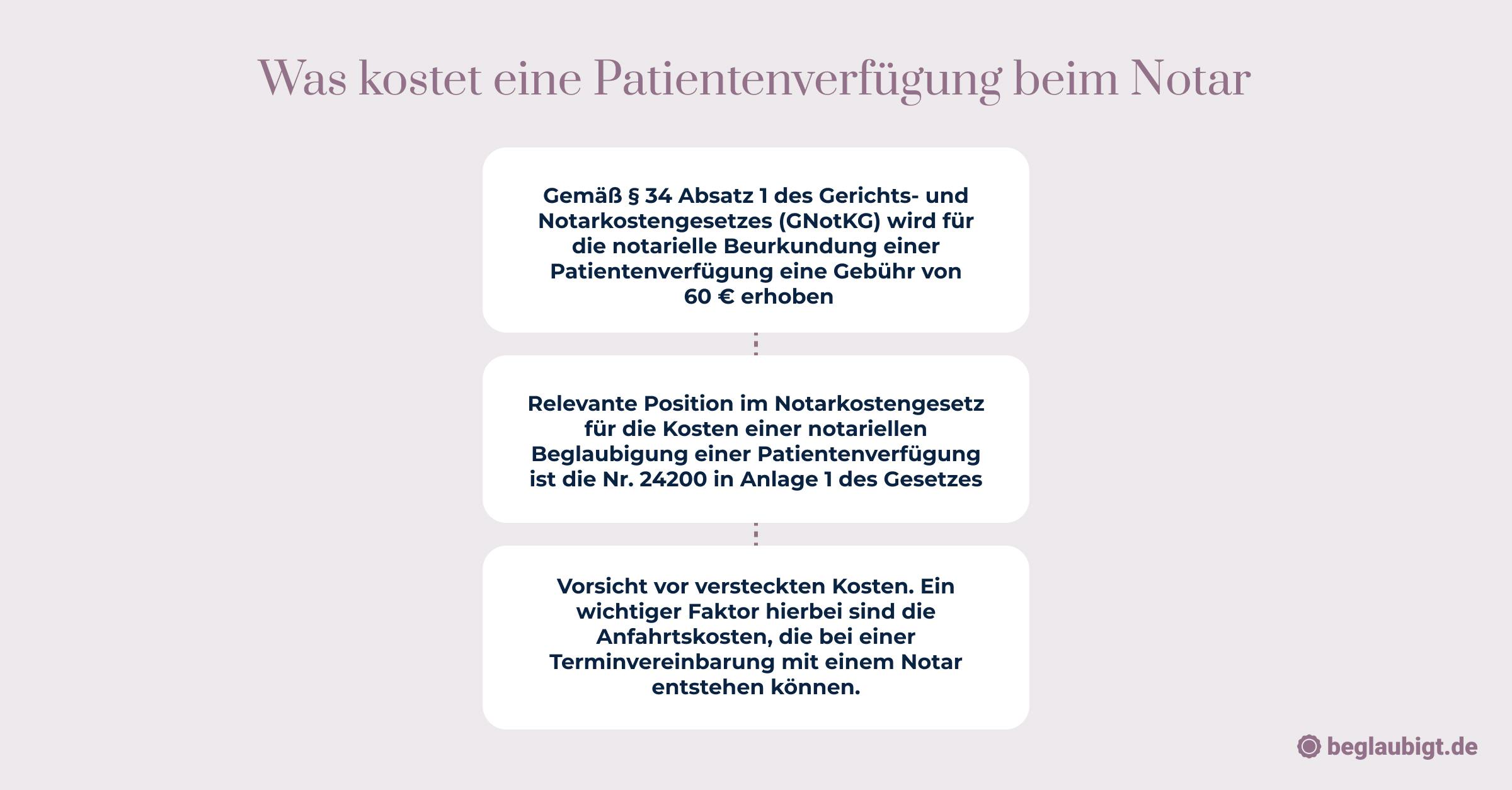
- Doctor: Some general practitioners offer assistance in creating a living will. Costs can vary depending on the time spent and materials used. Typically, the costs range between €50 and €100. However, it is important to note that while doctors can provide medical advice, they do not have legal expertise.
- Notary: Creating a living will with a notary has the advantage of legal expertise and assistance in drafting the document. The costs for notarial consultation and notarization of a living will vary depending on the scope of the consultation and the complexity of the document. They can range from €100 to €500.
- Lawyer: A lawyer can also help create a legally secure living will. The costs depend on the length of the consultation and the complexity of the case. Generally, costs can range between €200 and €700, depending on the lawyer’s hourly rate.
In this context, Beglaubigt.de offers an affordable and efficient alternative. Using the document creation tool from Beglaubigt.de is free and allows you to create an individualized, legally secure living will. You benefit from a structured process and the assurance that your living will complies with current laws and regulations.
With Beglaubigt.de’s online and digitalization options, you can conveniently create your living will from home, saving time and money compared to traditional alternatives like a doctor, notary, or lawyer. The legally secure creation and storage of your living will help prevent misunderstandings and issues in the future.
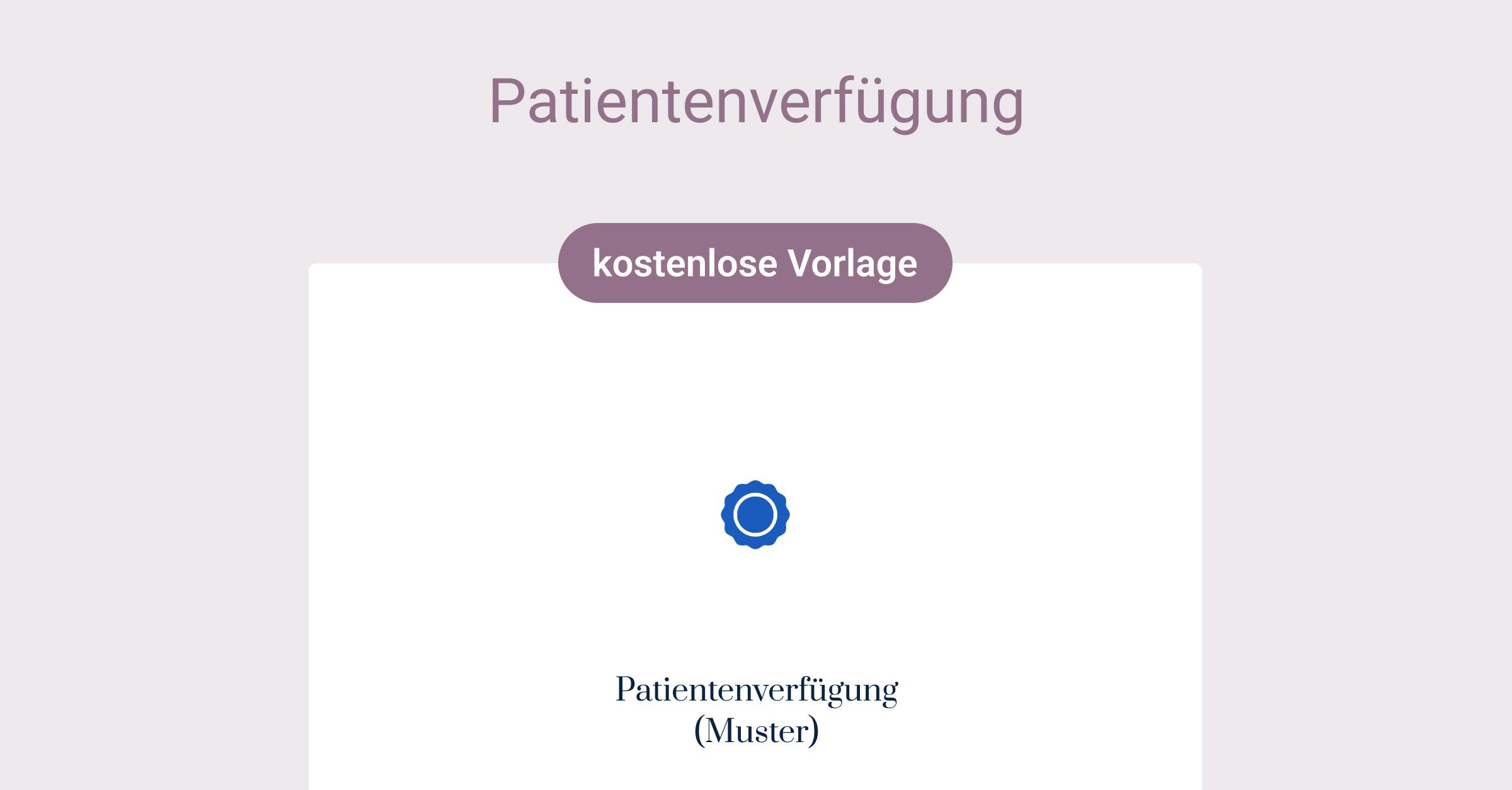
Which is Better: Living Will or Power of Attorney?
It is difficult to say whether a living will or a power of attorney is better, as both documents serve different functions and address different situations.
In many cases, it is advisable to create both a living will and a power of attorney to ensure comprehensive advance care planning. Below is a brief explanation of both instruments and their respective functions:
Living Will:
- Outlines the patient's wishes regarding medical treatments and procedures in certain situations.
- Applies when the patient is no longer able to express their will or make decisions.
- Is directed towards medical staff and doctors, who use the living will as the basis for their treatment decisions.
Power of Attorney:
- Allows a trusted person (the agent) to make decisions and take actions on behalf of the principal if they are no longer able to do so.
- Covers not only medical decisions but also financial, legal, and personal matters.
- Gives the agent the ability to act in line with the principal’s wishes and beliefs, even in situations not explicitly covered by the living will.
In many cases, it makes sense to create both a living will and a power of attorney to ensure comprehensive protection. A living will clearly and legally specifies your wishes for medical treatments, while a power of attorney ensures that a trusted person can make decisions on your behalf in line with your wishes, even in situations not explicitly covered by the living will.
By combining both instruments, you can ensure that your interests and wishes are respected and implemented in any life situation.
Storage and Updating of the Living Will
6.1. Where Should a Living Will Be Stored, and Who Should Be Informed? Who Gets the Original?
To ensure that your living will can be found and followed in an emergency, you should store it strategically and inform relevant people. Here are some suggestions for storage and communication:
Storage Locations:
- At Home: Place your living will in an obvious and easily accessible location, such as in a folder for essential documents.
- General Practitioner: Provide your doctor with a copy to ensure quick access if medical treatment is required.
- Central Advance Care Register: Consider registering your living will and any powers of attorney with the Federal Chamber of Notaries. Doctors and caregivers can quickly access this information in case of need.
- Beglaubigt.de: You might also consider storing your living will with Beglaubigt.de, offering an additional secure, digital storage option.
- People to Inform:
- Authorized Representative: If you have a power of attorney, ensure the representative has a copy of the living will and knows where the original is stored.
- Close Relatives and Friends: Make sure your loved ones are aware of your living will and where it is kept. This allows them to act quickly in emergencies and respect your decisions.
- Lawyer or Notary: If they were involved in drafting the will, they should have a copy and be informed of its storage location.
For maximum security, it is advisable to keep several copies of your living will. Regularly review and update the document to reflect your current wishes. Keep all involved parties informed of any updates so they are always aware of the latest version.
6.2. How Often Should a Living Will Be Reviewed and Updated?
There are no strict rules on how often a living will should be reviewed and updated. However, it is advisable to regularly reconsider your living will to ensure it reflects your current wishes, values, and personal circumstances. Here are some guidelines for determining when to review and update your living will:
- Regular Review: As a general rule, you should review your living will every 2 to 3 years to ensure it is still up to date. This allows you to account for changes in your health situation, values, or personal circumstances.
- Changes in Health: If your health changes significantly, you should review and possibly update your living will. This may be necessary after a diagnosis, surgery, or a marked decline in your health.
- Changes in Personal Circumstances: Changes in family, personal, or legal situations can also prompt a review of your living will. Examples include marriage, divorce, the birth of children or grandchildren, or the death of a close relative.
- Changes in Values: If your ethical, religious, or philosophical beliefs change over time, this may affect your views on medical treatments and procedures. In such cases, it’s advisable to update your living will to ensure it reflects your current values.
- Legal Changes: Changes in the law or new court rulings may also require a review and update of your living will. Stay informed about current developments in living will regulations to ensure that your will remains legally accurate and effective.
Whenever you review or update your living will, make sure that all relevant parties (e.g., representatives, family members, doctors) are informed of the changes and receive an updated copy. This ensures that your wishes are properly implemented if needed.
What Happens to an Old Living Will?
When you update or change your living will, it’s essential to dispose of the old version properly to avoid misunderstandings and confusion in a medical emergency. Here are some steps to follow when replacing your old living will:
- Destruction: Destroy the original and all copies of the old living will to ensure they can no longer be used. You can shred the documents, burn them, or cut them into small pieces.
- Inform Involved Parties: Notify everyone who had a copy of the old living will about the update. This includes your authorized representatives, family members, doctors, lawyers, and potentially the Federal Chamber of Notaries (if registered in the Central Advance Care Register). Ask them to destroy the old version and provide them with an updated copy.
- Updating the Central Advance Care Register: If your living will was registered in the Central Advance Care Register of the Federal Chamber of Notaries, you should update the registration and submit the new living will. This ensures that, if needed, the correct and current version of your living will is found.
- Storage of the New Living Will: Ensure that the original and all copies of the new living will are stored in the appropriate locations (e.g., at home, with your doctor, in the Central Advance Care Register). Inform all relevant people about where the updated document is kept.
By following these steps, you minimize the risk of misunderstandings and ensure that your current wishes and preferences are correctly implemented when necessary. Don’t forget to regularly review your living will and update it as needed to ensure it always reflects your current wishes and needs.
Have Courts Ever Accepted an Outdated Living Will?
There have been cases where courts had to deal with outdated living wills. A notable example is a 2016 ruling from the Federal Court of Justice (BGH) (Case No. XII ZB 61/16).
In this case, a woman created a living will in 2008 that excluded certain intensive medical measures. After suffering a stroke in 2011, she was given artificial nutrition. Her daughters disagreed on whether the living will applied in this situation, as it didn’t exactly cover the circumstances at hand.
The BGH ruled that the living will was too vague to be applied in this context. As a result, the nutrition was continued, potentially against the patient’s will. This highlights the importance of having a detailed and up-to-date living will to clearly communicate your intentions.
It underscores how crucial it is to regularly review and update living wills to reflect current medical and legal circumstances. When drafting such documents, it’s also important to include detailed instructions for various medical scenarios to ensure that your wishes are followed.
What Can Family Members Decide Without a Living Will?
In Germany, family members generally cannot make medical decisions for a patient without a living will. In such cases, a legal guardian or authorized representative (e.g., through a power of attorney) is usually required, appointed by the court or chosen by the patient. However, in some situations, family members can make decisions in consultation with the treating doctors based on the presumed will of the patient.
An example from case law illustrating this issue is a 2010 ruling by the Federal Court of Justice (BGH) (Case No. XII ZB 99/09). In this case, a woman had a stroke and was in a vegetative state, receiving artificial nutrition. She had not created a living will or power of attorney, and there were no indications of her presumed will regarding life-sustaining measures.
Her daughter applied to the guardianship court for permission to end the artificial nutrition, and the court agreed. However, the Higher Regional Court (OLG) overturned the decision, stating that there was insufficient evidence of the patient's presumed will. The BGH confirmed the OLG’s ruling, emphasizing that, in cases of doubt, it should always be assumed that the patient wishes to continue living.
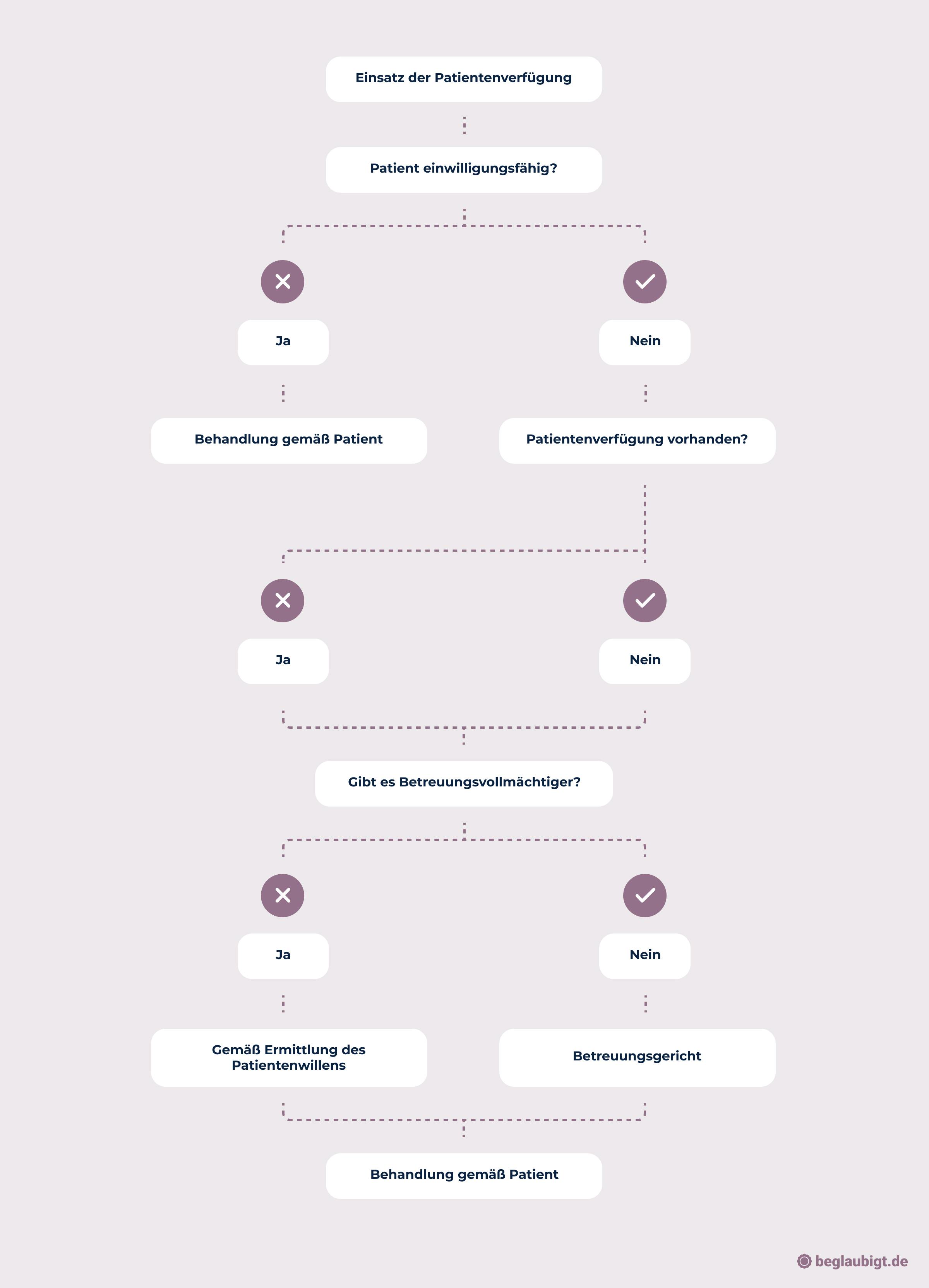
This case highlights how difficult it can be for family members to make decisions without a living will and underscores the importance of having a living will and/or a power of attorney to ensure that your wishes are respected and followed in critical situations.
To ensure that your family members can act on your behalf in your absence, you should consider creating both a living will and a power of attorney. The living will provides specific instructions for medical treatments, while the power of attorney authorizes one or more individuals to make decisions on your behalf when you are no longer able to do so.
Frequently asked questions
our users



